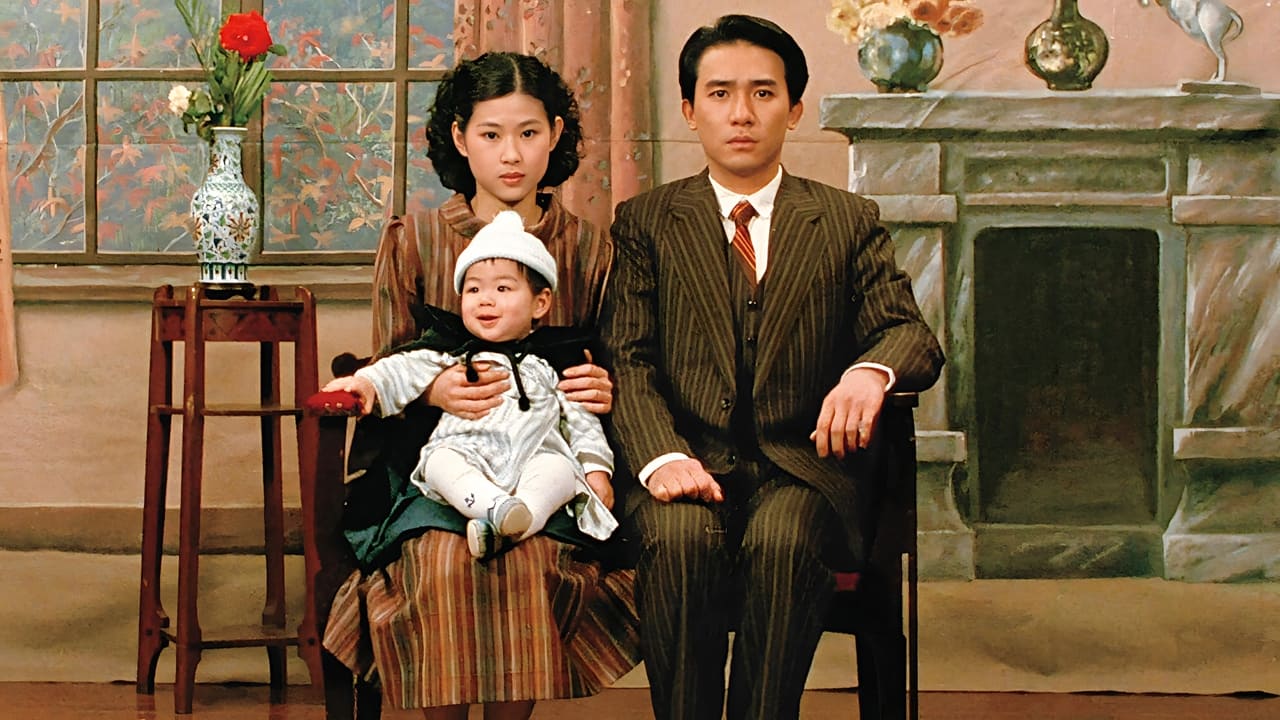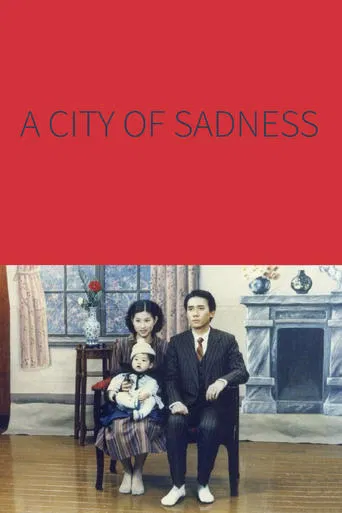

Hou Hsiou-Hsien's "A City of Sadness" is one of Oriental Cinema's most rewarding challenges. I have returned to it several times, always with a sense of awe, understanding it a little more on each occasion but still not always sure what is actually happening on the screen. Although this makes the experience sometimes frustrating, the miracle is that it never detracts from the gut feeling I have had from the very first viewing that I am watching a masterpiece. An ambitious attempt to capture the immediate post second world war period of Taiwanese history by following the members of one family through fragments of their daily lives rather than a carefully constructed continuous narrative, Hou's work resonates with tremendous feeling. As is usual with this director, the audience has to work hard to supply connections in a film without joins, in order to understand who is who and what is actually going on. I have to admit that some of the scenes of gang violence still elude me, but, these apart, the light is beginning to shine through. It is clear that the old man with the beret who sits often staring vacantly is the owner of that densely furnished restaurant; that he has four sons. The eldest, the sturdy looking one, seems perennially mixed up with figures of a gangster underworld, the second has returned from the war mentally damaged, the third did not return from active service in the Phillipines and is presumed dead. And then there is the youngest who has a photographer's studio and seems completely apart from the rest of the family by virtue of a sensitive, gentle nature and the disability of complete deafness brought on by a childhood accident. It is his fortunes and those of the young nurse he eventually marries that provide the sense of audience empathy that even the most obscure cinema need in order to work its magic. Their scenes provide moments of great tenderness in a relationship that relies entirely for communication on the written note such as the occasion when she needs to tell him about the beauty of a German folksong that is being played. When the country is placed under repressive martial law with massed executions for dissenters we have snippets of the deaf mute's experiences. There is a particularly telling moment when he is in captivity, unable to hear the sound of the firing squad from which he somehow mercifully escapes. In "A City of Sadness" it is short scenes such as this that one remembers so vividly. That it provides the experience of a sweeping epic without recourse to any great scenes of action is both its mystery and fascination.
... View MoreOn the evening of February 27th, 1947 in Taipei, police ruthlessly beat a woman selling illegal cigarettes and the next day opened fire on a protest demonstration outside the Presidential Palace. Years of resentment against a government increasingly defined by nepotism, corruption, and suppression of human rights exploded in open conflict. As soon as the troops arrived, they began the systematic round up and execution of scholars, lawyers, doctors, students and local leaders of the protest movement. In total between 18,000 and 28,000 people were murdered by Chinese troops sent from the mainland by Chiang Kai-shek. Thousands of others were arrested and imprisoned and martial law was established in what became known as the "White Terror" campaign.Hou Hsiao-hsien's magnificent 1989 film, City of Sadness, brings to light the truth about the 1947 massacre known as the 2/28 incident. Winner of the Golden Lion Award at the 1989 Venice Film Festival, City of Sadness treats one of the key issues of Taiwanese history, yet is far from being a political film. Its focus is not on the bloodshed but on the consequences for a particular family and how individual experience is impacted by the flow of time and history. In the film, Wen-heung (Chen Sown-yung), the oldest of four Lin brothers, tries to hold the family together with the support of Ah-lu (Li Ten-lu), the family patriarch. A brutish, feverishly emotional man, he has turned his Japanese bar into a family restaurant known as "Little Shanghai" but finds his business undermined by ruthless Shanghai gangsters. The second brother, Wen-sun disappeared in the Philippines and is talked about but never seen in the film.Brother number three, Wen-leung (Jack Gao) suffered mental problems as a direct result of the war and is bedridden at a local hospital. Amazingly, he recovers enough to deal with Shanghai drug smugglers but is framed as a Japanese collaborator and, after being beaten in prison, loses his mental balance again. The fourth Lin brother, Wen-ching is deaf and runs a photography studio. Wen-ching is involved with young anti-government socialists such as his friend Hinoe (Wu Yi-fang) who is forced to flee to the mountains to join the guerillas. Wen-ching also wants to join the movement but is persuaded to stay home and care for Hinoe's sister, Hinome (Hsin Shu-fen), a nurse, who loves him.As in all of Hou's films, there are no peak moments of dramatic interest to which everything else is simply a build up. The camera simply records the events from a distance without judgment or evaluation, allowing the complexities of the characters and situations to gradually unfold. Everything is relevant -- taking care of the baby, eating, cleaning the floor, and washing the dishes. This attention to the ordinary makes us realize that history happens to everyone, not only in the battlefield, but also in the quiet of everyday life. Far from being bogged down in banality, however, the film achieves transcendence in moments such as Hinome and Wen-ching listening to a German folk song, Wen-ching imitating the voice of an opera singer when he was only eight, the solitary flight of a bird after a sudden death, and the gentle caressing voiceover of Hinome.City of Sadness is a remarkable portrait of one of the most traumatic events in Taiwanese history and its popularity in Taiwan reflected its willingness to deal with a previously taboo subject. Hou said, "I didn't make A City of Sadness because I purposely wanted to open up old wounds'.but because I know that we have to face ourselves and our history if we are ever to understand who we are and where we're going." Though the film was criticized by some for being "politically ambiguous" and "historically inaccurate, the film's depiction of political events and its impact on Taiwan is clear and unmistakable. City of Sadness will not satisfy those seeking a political expose, but Hou's refusal to trivialize events for the sake of emotional appeal gives the film a universality of spirit that ensures its place among the most powerful cinematic statements of our time.
... View MoreI'm having difficulties rating this film. I gave Hou's last film (that I saw), Dust in the Wind, a 7/10 because I felt it was slight and sloppy, but good nonetheless. CoS is even sloppier, but it is not in any way slight. However, when I'm desperately struggling to understand the film, trying to identify characters and interpret events, a lot of the power seeps away. I feel that the characterizations of DitW were more clear (if, again, slight), but CoS, despite its apparent cast of hundreds, I only identified with (and could identify, for the most part) the two main characters. However, I really did end up loving them and was very affected by everything that happened to them. Luckily, as the film progresses, it becomes less about everyone and everything else and focuses on those two characters, entering the genre of such films as The Unbearable Lightness of Being and Doctor Zhivago, i.e., movies where war is examined from the point of view of those who want desperately to live and love without hinderance, but keep getting pulled into the conflict. Still, the first three quarters of the film are very loose. I found myself saying often: "I can't recognize a single individual in this scene." I also kept coming back to the idea that this story would make a much better novel than a film. In a novel, it's much easier to follow the action.While Hou's narrative is still poorly devised (he wasn't the screenwriter, anyways), his cinematic technique is improving by leaps and bounds as I go from one film to the next. His shot composition utilizes depth to a great extent. We often see the action from a distance, and he uses the technique of blocking, putting characters and objects in front of the main action, to astonishing effectiveness. It makes us feel helpless in many of the more painful scenes.SLIGHT SPOILER: There's at least one amazing edit to which I have to call attention: the characters are all at a funeral and then there is a cut to an extreme long shot which encompasses a whole, small peninsula of Taiwan with the vast ocean behind it. In the distance, we see (and hear) a procession. I assumed it was a funeral procession, but the next scene reveals that it was a marriage procession, a marriage that I was beginning to doubt was ever going to happen. The funeral scene and wedding scene are masterfully connected with the intricate Buddhist ceremonies, and the emotional effects of this juxtaposition is marvelous. One more master scene that I have to point out is one where the deaf character (forgive me, but I tend to mix Asian names up and I don't even want to try) is in prison and soldiers take away two of his cellmates. We see a medium close-up of the deaf man and we hear two shots. I cringed, but of course, the character doesn't react because he can't hear them. The implications of that left me shivering.END SPOILER: So what am I going to give it, a 7 or an 8? I choose 7, but with the stipulation that I want to come back to it someday in the future to see if I can comprehend the narrative better. It's certainly a fine film, but I do feel justified in my complaints. There's also the fact that, as this is a foreign film, and it has a lot of dialogue, I'm so busy reading the subtitles that it is easy to miss who is who. One thing I don't want to hear from people is how important the events depicted are for Taiwan. That doesn't matter. I'm criticizing a film here, not history.
... View MoreNeedless to comment on Hou's excellent artistic directing, the story itself tightly revolves around an average Taiwanese family's life during the years 1945-1949 when Japanese occupation ended and KuoMinTang from mainland took over. There are conflict on personal/family level between native Taiwanese (BenShengRen) and mainland newcomers(WaiShengRen), and massive political prosecution and massacre of native intellectuals by KuoMinTang. Hou painted an inspiring (rather than sad) picture of the native intellectuals giving their lives to earn their fellow Taiwanese dignity which was ironically more lacking during the KuoMinTang ruling than Japanese ruling.
... View More